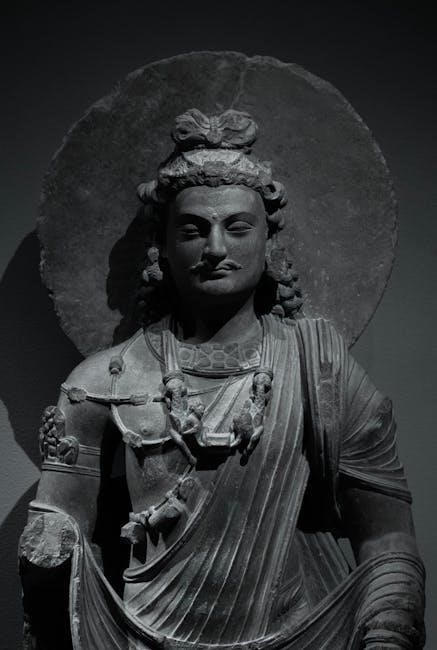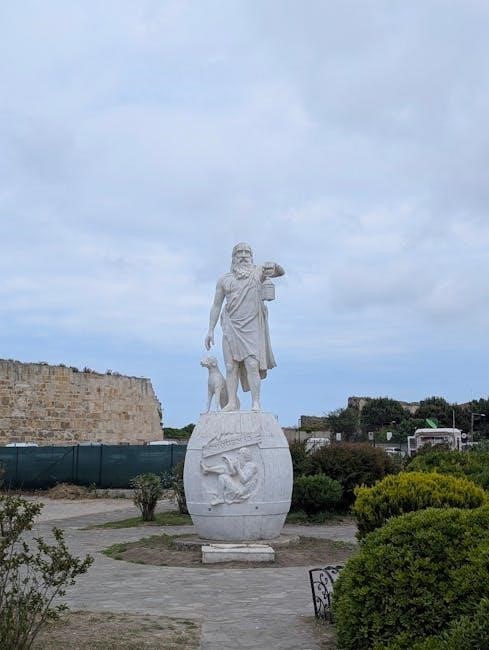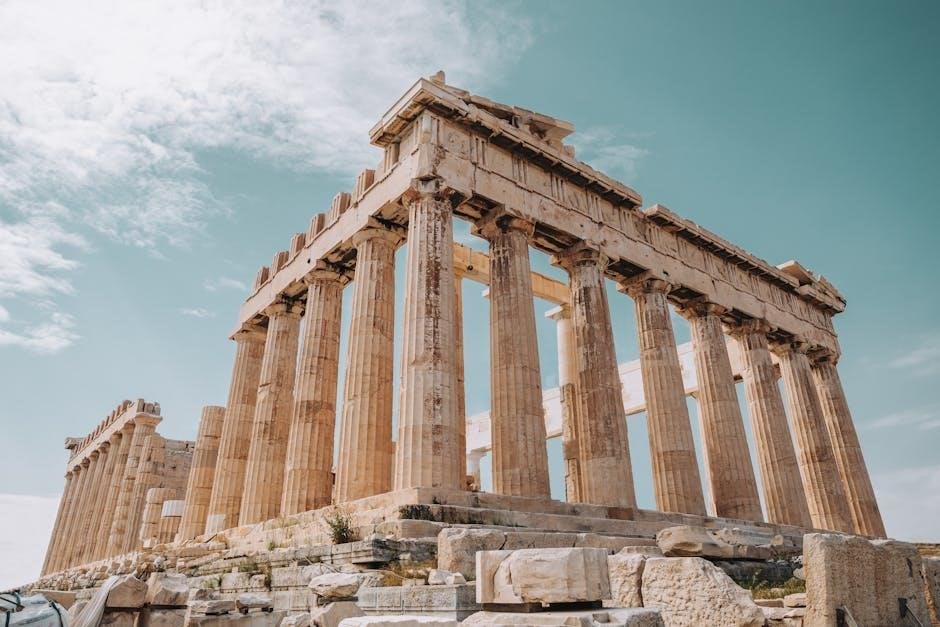percy jackson greek gods pdf

Rick Riordan’s Percy Jackson’s Greek Gods offers a fresh, humorous take on Greek mythology, narrated by Percy Jackson. The PDF version is widely available on platforms like PDFDrive and z-lib.org.
Overview of the Book
Percy Jackson’s Greek Gods is a captivating retelling of Greek mythology, narrated by Percy Jackson himself. The book offers a modern, humorous twist on classic myths, making them relatable and engaging for readers of all ages. It covers key stories about gods, heroes, and monsters, presented in Percy’s signature witty style. The PDF version, available on platforms like PDFDrive and z-lib.org, allows easy access to this entertaining and educational read. Fans of Greek mythology and Percy Jackson alike will appreciate the fresh perspective and insightful commentary on timeless tales.
Importance of Greek Mythology in Percy Jackson’s Work
Greek mythology plays a central role in Percy Jackson’s Greek Gods, as it bridges ancient stories with modern appeal. By retelling these myths through Percy’s perspective, Rick Riordan makes them relatable and engaging for contemporary readers. The book not only entertains but also educates, introducing younger audiences to the rich tapestry of Greek mythology. Its humor and wit ensure that the timeless tales remain fresh and accessible. The PDF version, available on platforms like PDFDrive and z-lib.org, further enhances its reach, making it a valuable resource for fans and learners alike.
Rick Riordan’s Approach to Mythology
Rick Riordan’s approach to mythology in Percy Jackson’s Greek Gods is both innovative and faithful to the originals. He infuses humor and modern sensibilities, making ancient myths relatable and entertaining for a younger audience. By blending wit with tradition, Riordan creates a unique voice that respects the source material while offering fresh perspectives. His storytelling highlights the human-like flaws and strengths of the gods, making them more accessible. This approach not only educates but also captivates readers, ensuring the myths remain vibrant and relevant in the modern world.
The Structure of Percy Jackson’s Greek Gods
Percy Jackson’s Greek Gods is structured as a retelling of key myths, blending humor and modern language. Each chapter focuses on a major god or myth, creating an engaging and accessible format for readers of all ages.
Chapters and Key Myths Covered
Percy Jackson’s Greek Gods is divided into chapters, each focusing on a major god or hero. The book retells myths like Zeus’s rise to power, Poseidon’s reign over the seas, and Hades’ rule of the Underworld. Key stories include Persephone’s abduction, Theseus vs. the Minotaur, and Hercules’ twelve labors. Percy’s narration adds humor and modern twists, making ancient tales relatable. The chapters also cover lesser-known myths, ensuring a comprehensive yet engaging overview of Greek mythology. Each section balances detail with brevity, offering a fresh perspective on timeless stories.
Narrative Style and Percy’s Perspective
Rick Riordan’s narrative style in Percy Jackson’s Greek Gods is fresh and engaging, as Percy retells ancient myths with his signature humor and relatability. The first-person perspective makes the stories feel personal, as if Percy is sharing them with a friend. His modern language and casual tone simplify complex myths, making them accessible to a younger audience. Percy’s character shines through, as his wit and occasional sarcasm add a contemporary twist to timeless tales. This approach not only entertains but also helps readers connect emotionally with the stories, blending education with enjoyment seamlessly.
Modern Interpretation of Ancient Myths
Rick Riordan breathes new life into ancient Greek myths by infusing them with modern sensibilities in Percy Jackson’s Greek Gods. He reimagines the gods and their stories with relatable human flaws, making them feel contemporary while retaining their timeless essence. The book’s humor and fresh perspective appeal to modern readers, especially younger audiences, by connecting ancient tales to today’s culture. Riordan’s approach emphasizes the universal themes of mythology, such as family, power, and destiny, proving that these stories remain relevant in the modern world. This reinterpretation makes mythology accessible and engaging for a new generation.

Major Greek Gods in Percy Jackson’s Greek Gods
The book showcases major Greek gods like Zeus, Poseidon, and Hades, highlighting their distinct personalities and roles through Percy’s humorous and relatable storytelling style.
Zeus: The King of the Gods
In Percy Jackson’s Greek Gods, Zeus is portrayed as the mighty ruler of Mount Olympus, commanding the skies and thunder. His authoritative yet often stubborn nature is highlighted through Percy’s witty narration. Zeus’s leadership is both admired and criticized, showcasing his complex character. Percy’s retelling emphasizes Zeus’s role in shaping Greek mythology, from his famous lightning bolt to his numerous decisions that influenced the fates of gods and mortals alike. The book captures Zeus’s grandeur and flaws, making him a relatable and memorable figure in Percy’s engaging storytelling style.
Poseidon: The God of the Sea
Poseidon, the powerful god of the sea, is vividly portrayed in Percy Jackson’s Greek Gods. Known for his trident and control over the oceans, Poseidon is depicted as strong and authoritative. Percy highlights Poseidon’s role in shaping Greek mythology, from creating horses to his rivalry with Athena. His complex personality, balancing fierce leadership with unexpected kindness, makes him a fascinating figure. Percy’s narration brings Poseidon to life, blending humor with reverence, making the god of the sea relatable and memorable in this modern retelling of ancient myths.

Hades: The God of the Underworld
Hades, the ruler of the Underworld, is a central figure in Percy Jackson’s Greek Gods. Often misunderstood, Hades is portrayed as a strict but fair god, governing the dead with precision. Percy highlights his iconic helmet of darkness and his role as the enforcer of the natural order. Despite his intimidating reputation, Hades shows a softer side, particularly in his love for Persephone. His story, as retold by Percy, balances the eerie mystery of the Underworld with a sense of dry humor, making Hades a compelling and complex character in modern mythology.
Hera: The Queen of the Gods
Hera, Zeus’s wife and the queen of Mount Olympus, is a powerful and maternal figure in Percy Jackson’s Greek Gods. Known for her regal presence and iconic symbols like the peacock and crown, Hera embodies both strength and vulnerability. Her role as a protector of marriage and family is central, yet her famous jealousy over Zeus’s infidelities adds depth to her character. Percy’s narrative highlights her complex nature, blending her majesty with relatable emotions. Her story, filled with both triumph and heartache, showcases her enduring influence in Greek mythology and modern retellings alike.

Demeter: The Goddess of Agriculture
Demeter, the goddess of agriculture and fertility, is warmly portrayed in Percy Jackson’s Greek Gods. Known for her nurturing spirit and association with harvests, she is often depicted with grains and torches. Her famous story with Persephone, her daughter, explains the changing of the seasons. Percy’s retelling captures her maternal love and the depth of her grief, making her relatable. Her role in sustaining life and her influence on nature highlight her importance in Greek mythology, offering a fresh perspective on her legacy through Percy’s engaging narration;
Athena: The Goddess of Wisdom
Athena, the goddess of wisdom, warfare, and crafts, is uniquely portrayed in Percy Jackson’s Greek Gods. Born from Zeus’s head after he swallowed her pregnant mother, Athena emerges as a powerful, armor-clad deity. Known for her intelligence and strategic mind, she often outsmarts other gods and mortals alike. Percy highlights her practical nature, emphasizing her role as a problem-solver. Her iconic symbols, the owl and olive tree, reflect her wisdom and peaceful intentions. Athena’s stories, such as her contest with Poseidon and her rivalry with Ares, showcase her strength and leadership, making her one of the most admired gods in Greek mythology.
Apollo: The God of the Sun and Music
Apollo, the god of the sun, music, poetry, and prophecy, is vividly portrayed in Percy Jackson’s Greek Gods. Known for his charisma and artistic talents, Apollo is often depicted playing his iconic lyre, which mesmerizes both mortals and gods. His rivalry with Pan and his role as the leader of the Muses highlight his cultural significance. Percy’s narration captures Apollo’s confident and sometimes arrogant personality, as well as his deep bond with his twin sister, Artemis. Stories about his musical prowess and his role at the Oracle of Delphi showcase his enduring impact on Greek mythology and culture.
Artemis: The Goddess of the Hunt
Artemis, the goddess of the hunt, wilderness, and the moon, is portrayed as a fiercely independent and skilled archer in Percy Jackson’s Greek Gods. As Apollo’s twin sister, she shares his radiant presence but embodies a wild, untamed energy. Known for her unwavering dedication to her domain, Artemis is often depicted leading her companions, the nymphs, in the hunt. Percy’s narration highlights her strong will and her role as a protector of young girls and the natural world. Her stories, such as her defense of her purity and her vengeance against those who cross her, showcase her unyielding character.
Ares: The God of War
Ares, the god of war, is depicted in Percy Jackson’s Greek Gods as brutal and bloodthirsty, thriving on chaos and violence. Unlike Athena, who represents strategic warfare, Ares embodies the raw, savage aspect of battle. Percy’s narration highlights Ares’ delight in conflict and his disregard for honor or strategy. His role in myths, such as the Trojan War, showcases his relentless aggression and clashes with other gods like Athena and Hera. Ares’ children, including Deimos and Phobos, reflect his dark and fearsome nature, making him a compelling yet terrifying figure in Percy’s retelling of Greek mythology.
Aphrodite: The Goddess of Love
Aphrodite, the goddess of love and beauty, is portrayed in Percy Jackson’s Greek Gods as charming and alluring, yet cunning. Born from the sea foam, she embodies desire and passion, often manipulating relationships for her amusement. Percy’s narration highlights her complex nature, showcasing her as both a powerful deity and a figure of humor. Her marriage to Hephaestus and affairs, such as with Ares, reveal her unpredictable character. Aphrodite’s role in myths, including her son Eros’ mischievous actions, demonstrates her influence over love and chaos, making her a fascinating yet tricky figure in Percy’s retelling of Greek mythology.
Hephaestus: The God of the Forge
Hephaestus, the god of fire, blacksmiths, and invention, is uniquely portrayed in Percy Jackson’s Greek Gods. Known for his exceptional craftsmanship, he creates legendary weapons and armor, such as Achilles’ shield. Despite his physical limp, Hephaestus is a master of his craft, showcasing his intelligence and creativity. Percy’s narration highlights his resilience and resourcefulness, turning his struggles into strengths. Hephaestus’s role as the gods’ blacksmith and his complex relationships, including his marriage to Aphrodite, reveal his multifaceted character, blending humor with admiration for his skills; His story in the book emphasizes the power of intellect and perseverance.

Hermes: The Messenger of the Gods
Hermes, the swift and cunning messenger of the gods, is vividly portrayed in Percy Jackson’s Greek Gods. Known for his winged sandals and incredible speed, Hermes is often depicted as the go-to messenger for Olympus. His cleverness and charm make him a likable figure, but his mischievous side is equally highlighted. Percy’s narration captures Hermes’s dual role as a trickster and a responsible guide, often helping heroes like Hercules. His wit and versatility make him a fascinating character, blending humor with admiration for his swift and clever nature.
Dionysus: The God of Wine and Festivals
Dionysus, the god of wine, festivals, and ecstasy, is portrayed in Percy Jackson’s Greek Gods as a vibrant and unconventional figure. His wild celebrations and association with theater and wine highlight his lively nature. Percy’s narration brings out Dionysus’s unpredictable behavior, blending humor with his divine authority. His unique role in mythology, often challenging the norms of Olympus, makes him a memorable character. The book captures his essence as a god who embraces life’s pleasures, adding a dynamic element to the stories of Greek mythology.
Heroes and Monsters in Percy Jackson’s Greek Gods
The book vividly explores iconic heroes like Perseus and Theseus, alongside terrifying monsters such as Medusa and the Minotaur, blending bravery with mythological chaos.
Perseus and the Story of Medusa
Perseus, a brave hero, embarks on a perilous quest to behead Medusa, the serpent-haired Gorgon whose gaze turns men to stone. With the help of Athena and Hermes, he secures magical tools like a mirrored shield and winged sandals. The story highlights his cunning and bravery as he outsmarts Medusa and escapes her vengeful siblings. This classic tale symbolizes the triumph of wisdom and courage over monstrous forces. Riordan’s retelling in Percy Jackson’s Greek Gods offers a fresh, engaging spin, making the ancient myth relatable and entertaining for modern readers while preserving its timeless appeal.
Theseus and the Minotaur
In Percy Jackson’s retelling of Greek myths, Theseus’s battle with the Minotaur is a highlight. The story begins with King Minos of Crete commissioneding the labyrinth to confine the Minotaur, a monstrous creature born from Queen Pasiphae’s affair with a bull. To appease the beast, Athens must send seven youths and seven maidens as sacrifices. Theseus, determined to end this brutality, volunteers and slays the Minotaur with the help of Ariadne, Minos’s daughter, who provides a magical thread to navigate the labyrinth. Riordan’s version captures the bravery and cunning of Theseus, while adding a modern twist to the ancient tale.

Orpheus and Eurydice
In Percy Jackson’s rendition of Greek myths, the story of Orpheus and Eurydice is poignantly retold. Orpheus, a gifted musician and poet, falls deeply in love with Eurydice, who tragically dies soon after their wedding. Heartbroken, Orpheus journeys to the Underworld, charming even the stern rulers Hades and Persephone with his music. They agree to let him take Eurydice back on one condition: he must not look at her until they reach the surface. Orpheus’s doubt and longing lead to a heartbreaking ending, as he glances back, losing her forever. Riordan’s version captures the emotional depth and tragedy of this myth, blending it with Percy’s witty commentary.
Heracles (Hercules) and His Twelve Labors
In Percy Jackson’s Greek Gods, Heracles, known as Hercules in Roman myths, is portrayed as a demigod with extraordinary strength. His twelve labors, set by King Eurystheus, showcase his remarkable abilities. From slaying the Nemean Lion to capturing Cerberus, Heracles faces each challenge with determination. Percy’s narration adds humor, highlighting Heracles’ humanity despite his divine heritage. The labors not only demonstrate his power but also reveal his perseverance and the complexities of his character. Riordan’s retelling makes the ancient tale relatable and engaging, blending action with wit.
The Story of Daedalus and Icarus
In Percy Jackson’s Greek Gods, Daedalus, a brilliant inventor, crafts wings of feathers and wax to escape imprisonment on Crete. He and his son, Icarus, soar through the skies, but Icarus ignores Daedalus’ warnings and flies too close to the sun, melting the wax. Tragically, Icarus plunges into the sea. Percy retells this myth with humor, highlighting the ingenuity of Daedalus and the recklessness of Icarus. The story serves as a timeless lesson about balancing ambition with caution, while Percy’s modern spin makes the ancient tale relatable and engaging for young readers.

The Role of Percy Jackson as a Narrator
Percy Jackson’s witty and relatable voice brings Greek myths to life, offering a fresh, modern perspective while maintaining the essence of the original stories.
Percy’s Perspective on Greek Myths
Percy Jackson’s perspective on Greek myths is both humorous and insightful, blending his personal experiences with the gods. His narration makes the myths relatable by highlighting the flaws and quirks of divine characters. Percy’s voice adds a modern twist, often comparing ancient stories to his own adventures. He humanizes the gods, making them more accessible and entertaining for readers. His unique viewpoint also challenges traditional interpretations, offering a fresh lens through which to view classic tales. This approach helps readers connect emotionally with the stories, making Greek mythology feel relevant and engaging in a contemporary context.
Humor and Relatability in the Narration
Percy Jackson’s narration in Greek Gods is infused with humor, making ancient myths feel fresh and entertaining. His sarcastic remarks and modern comparisons, like likening the gods to dysfunctional family members, create a relatable tone. Percy’s voice bridges the gap between ancient tales and contemporary readers, often poking fun at the absurdity of mythological situations. This humor, combined with his down-to-earth perspective, makes the stories accessible and engaging. Readers find themselves laughing at Percy’s witty observations while connecting with the universal themes of the myths, making the book a delightful read for both young and adult audiences.
How Percy’s Character Shapes the Retelling

Percy Jackson’s retelling of Greek myths is deeply influenced by his character, blending his personal experiences with ancient stories. His bravery and loyalty shine through, making the myths relatable. Percy’s sarcastic humor and modern perspective add a fresh twist, while his interactions with gods and monsters provide unique insights. His character development and adventures shape his narrative lens, highlighting themes like friendship and perseverance. By adding his voice, Percy humanizes the gods, making their stories engaging and accessible. His perspective ensures the myths resonate with contemporary readers, offering both entertainment and timeless lessons.

Themes and Lessons from the Book
Percy Jackson’s Greek Gods explores themes of morality, fate, and family, offering timeless lessons through mythological stories. The book highlights courage, loyalty, and the complexities of divine nature, making ancient myths relatable and engaging for modern readers while preserving their original essence and moral depth;
Morality and the Nature of the Gods
Percy Jackson’s Greek Gods delves into the moral complexities of divine beings, showcasing their flaws and imperfections. The gods are portrayed as human-like, with traits like jealousy, pride, and love, making their actions relatable yet questionable. This retelling highlights that morality isn’t black and white, even for gods. Riordan’s narrative challenges readers to question the ethics of divine decisions, emphasizing that power doesn’t equate to perfection. The book teaches that true heroism lies in understanding and learning from these imperfections, offering a fresh perspective on ancient myths and their relevance to modern ethical dilemmas.
Fate and Free Will in Greek Mythology
Percy Jackson’s Greek Gods explores the tension between fate and free will, central to Greek mythology. The Moirai, or Fates, weave the thread of destiny, determining the course of lives. Yet, characters like Hercules and Perseus challenge fate, showing that free will can shape outcomes. Percy’s narration highlights this paradox, emphasizing that even gods aren’t entirely bound by fate. This duality teaches that while destiny may set boundaries, individual choices and courage can redefine one’s path, offering a timeless lesson on the power of action and decision-making in the face of predetermined outcomes.
The Importance of Family and Loyalty
In Percy Jackson’s Greek Gods, family and loyalty are central themes, reflecting the complexities of Greek mythology. Percy’s narration often highlights how gods and heroes prioritize family ties, even when flawed. Zeus’s leadership of the Olympians, despite sibling rivalries, underscores the importance of unity. Similarly, heroes like Hercules and Perseus face challenges driven by familial obligations. Loyalty, however, is tested when personal interests clash with divine duties. Percy’s humorously candid perspective reveals how these ancient stories resonate with modern ideas of family, duty, and the sacrifices made for loved ones, making the myths relatable and enduring.
Accessibility and Educational Value
Percy Jackson’s Greek Gods simplifies complex myths, making them accessible to younger readers. Its engaging storytelling and modern language bridge ancient tales with contemporary appeal, fostering educational value.
Using Percy Jackson’s Greek Gods as a Learning Tool
Percy Jackson’s Greek Gods is an excellent learning tool for introducing students to Greek mythology. Its engaging narrative and modern twist make ancient myths relatable and fun. Educators often use the book to spark interest in classical studies, as it aligns with curriculum goals while keeping young readers entertained. The PDF version is particularly handy for classroom use, allowing easy access and annotation. Riordan’s humorous and approachable style helps students retain mythological details, making it a valuable resource for both teachers and learners aiming to explore Greek mythology in an interactive way.
Comparing the Book to Traditional Mythology Sources
Percy Jackson’s Greek Gods offers a fresh, modern take on classic myths, differing significantly from traditional sources like Hesiod’s Theogony or Ovid’s Metamorphoses. While traditional texts present myths in a formal, historical context, Riordan simplifies and humorously retells them through Percy’s voice. This approach makes the stories more accessible to contemporary readers, especially younger audiences. However, traditional sources provide deeper cultural and historical insights, making them invaluable for scholarly study. The PDF version of Riordan’s book serves as an engaging gateway to mythology, encouraging readers to explore more traditional and detailed accounts of Greek myths.
Community and Fan Reception
Fans worldwide praise Percy Jackson’s Greek Gods for its engaging storytelling and humor. The PDF version has been widely shared, with readers appreciating its accessibility and modern twist.
Reader Reviews and Feedback
Readers enthusiastically praise the Percy Jackson’s Greek Gods PDF for its engaging storytelling and humor. Many appreciate the convenience of the digital format, allowing easy access to myths retold through Percy’s lens. Fans highlight how the modern twist on ancient tales makes them more relatable and fun, especially for younger audiences. Educators often recommend the PDF for its readability and educational value in classrooms. Overall, the feedback underscores the book’s ability to captivate readers while staying true to the spirit of Greek mythology, enhanced by Percy’s witty commentary.
Impact on Popular Culture
Percy Jackson’s Greek Gods PDF has significantly influenced popular culture by revitalizing interest in Greek mythology. Its engaging retelling of myths has inspired countless fans, making it a staple in modern young adult literature. The book’s success has led to adaptations, spin-offs, and a broader cultural appreciation for mythological stories. The availability of the PDF version has further amplified its reach, allowing readers worldwide to access Percy’s unique take on ancient tales. This has cemented the series’ place as a cultural phenomenon, bridging the gap between traditional mythology and contemporary storytelling.

Availability and PDF Versions
The Percy Jackson’s Greek Gods PDF is widely available on platforms like PDFDrive and z-lib.org, making it easily accessible worldwide.
Where to Find Percy Jackson’s Greek Gods in PDF Format
Percy Jackson’s Greek Gods is widely available in PDF format on popular platforms like PDFDrive and z-lib.org. These websites offer free access to the book, making it easy for readers to download and enjoy. The PDF version retains the original content, including Percy’s engaging narration and humor. Fans of Greek mythology and Percy Jackson alike can conveniently access this retelling of classic myths. However, always ensure to respect copyright laws and verify the legality of downloads in your region.
Platforms Like PDFDrive and z-lib.org
Popular platforms like PDFDrive and z-lib.org provide easy access to Percy Jackson’s Greek Gods in PDF format. These sites are well-known for offering a wide range of free eBooks, allowing readers to download and enjoy the book without any cost. Users can search for specific titles and download them quickly. The PDF versions are convenient for reading on various devices. However, it’s essential to be cautious, as not all content may be legally available. Always verify the legality of downloading in your region to ensure compliance with copyright laws. This makes these platforms convenient yet requires mindful usage.





